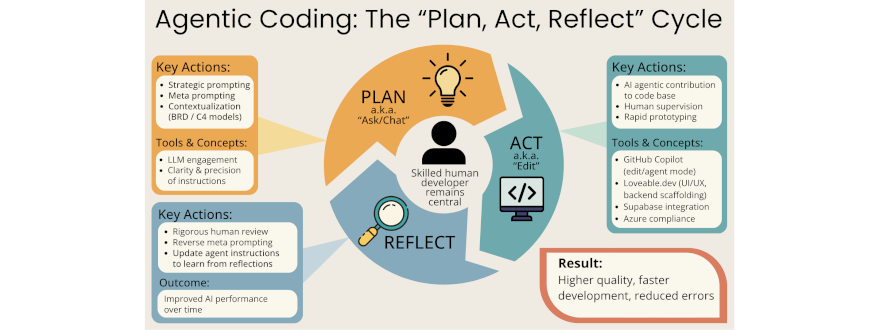
The rapid evolution of technology, especially in Artificial Intelligence, presents both opportunities and challenges. For small- to medium-sized businesses (SMBs), leveraging these advancements effectively is crucial for growth and staying competitive. At Proactive Technology Management (PTM), we are dedicated to translating complex technological capabilities into real-world business advantages for our clients.
A recent internal “Lunch & Learn” session, led by Michael Schreiber, our Director of Fusion Development and chief architect of our AI solutions, highlighted a significant step forward in this mission: the adoption of Agentic Coding Best Practices. This approach moves beyond AI as a simple tool, enabling Large Language Models (LLMs) to become active participants in the software development lifecycle—assisting with planning, implementation, debugging, and even reflecting on the code itself. By integrating these AI-driven techniques into our development methodology, we are enhancing our ability to deliver comprehensive data solutions, robust process automation, and intelligent custom AI tools for SMBs. This practice substantially boosts our ability to perform effective Business Process Re-engineering (BPR), making impactful solutions more accessible, quicker to implement, and more economically viable for businesses looking to truly optimize their operations.
Artificial Intelligence is a constant topic of discussion, yet at PTM, our focus remains steadfast on practical applications that yield measurable returns. Michael Schreiber’s exploration of agentic coding exemplifies this principle. His seminar provided our team with actionable insights into tools and methodologies that empower us to build superior solutions with greater speed. This dedication to ongoing learning and the adoption of advanced, yet practical, technologies is fundamental to PTM’s commitment to innovation and client success.
Traditional software development, while methodical, can sometimes struggle to match the agile demands of today’s SMBs. The persistent challenge is delivering sophisticated, customized solutions without incurring enterprise-level costs or extended timelines. Agentic coding, as a component of our wider development strategy, represents a significant advancement in our ability to meet this need effectively.
What is this agentic coding that Michael Schreiber shared, and why is it generating such positive anticipation within our team? It signifies a shift where LLMs evolve from passive coding aids to active, structured collaborators. The methodology is anchored in a continuous cycle: Plan, Act, and Reflect.
Michael Schreiber also detailed the specific tools that form PTM’s agentic development toolkit. Lovable.dev serves our needs for front-end wireframing and rapid UI/UX prototyping, fitting well with our Lean UX approach. Its Supabase integration facilitates quick backend scaffolding, which can be self-hosted in Azure to meet stringent compliance needs like SOC 2 or HIPAA. For more complex backend development—whether using ASP.NET, Python frameworks like FastAPI, or building asynchronous services—our developers use GitHub Copilot agents within their preferred Integrated Development Environments (IDEs), such as VS Code. These agents offer flexible AI assistance through “ask,” “edit,” and the newer agentic coding modes, applicable to any codebase. A key principle is to provide the AI agent with comprehensive context—PRDs, C4 model JSON exports (e.g., from IcePanel), or other vital documentation—to ensure its contributions align perfectly with the project’s architecture and objectives.
This internal advancement in agentic coding directly translates into more powerful and efficient delivery of PTM’s comprehensive solutions for SMBs. Our approach integrates data, automation, and intelligence. Agentic coding acts as an accelerator across these areas:
This boosted development capability directly enhances our Business Process Re-engineering (BPR) offerings, which are tailored for the practical needs of SMBs. Instead of merely automating existing, possibly inefficient, processes, AI, now amplified by agentic coding, aids us in designing and implementing fundamentally improved workflows. We deliver these transformative solutions through agile, typically 3-month, sprints. This ensures rapid, tangible results and allows for continuous value delivery through iterative development of functional vertical slices that clients can interact with and validate, building momentum and ensuring precise alignment with business objectives.
The advantages for our SMB clients are substantial and direct:
It is important to recognize that agentic coding, despite its power, functions as an AI-assisted methodology, not an AI-replacement. The skilled human developer remains central to the entire process. Our PTM professionals are more than just users of AI; they are experienced architects, insightful strategists, and diligent quality guardians. Their crucial expertise includes:
This human-in-the-loop governance ensures that we harness the speed and processing power of AI without compromising the quality, security, and nuanced understanding that only human expertise can provide. This synergy allows us to offer solutions where we confidently transfer full ownership of all code, models, and data to our clients, complemented by comprehensive training, empowering them for sustained success.
Michael Schreiber’s insights into agentic coding best practices mark a significant evolution in PTM’s capacity to serve SMBs. By weaving these AI-assisted techniques into our development framework, PTM is better equipped than ever in helping businesses address their most challenging issues in process automation, cloud data analytics, and the strategic use of generative AI. We are not just constructing software; we are helping to build more agile, efficient, and future-ready organizations.
Key Takeaways:
PTM’s advanced development approach is designed to help SMBs like yours drive innovation and growth. If you are looking to move beyond simply optimizing old methods and are ready to fundamentally rethink your core operations, PTM can help you achieve this, accelerated by AI and expertly guided by our experienced team.
Ready to explore how AI-accelerated BPR and cutting-edge development practices can transform your business?
Follow Michael Weinberger on LinkedIn for more insights on AI, BPR, and SMB transformation (Turn on alerts!).
Schedule your free discovery consultation today to discuss your specific needs.
Identify bottlenecks, automate workflows, and build fast.
Get Started Today